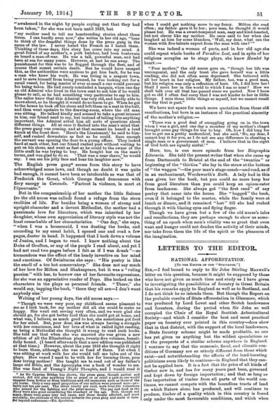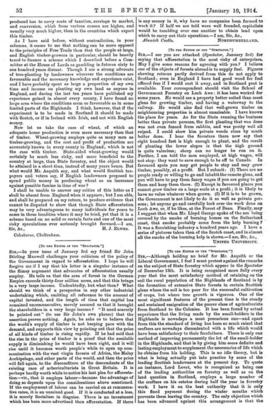LETTERS TO THE EDITOR.
NATIONAL AFFORESTATION.
(To rsa Essen Os Tee "Srscraron."] feel bound to reply to Sir John Stirling Maxwell's letter on this question, because it might be supposed by those who have not given as much time and study as I have given to investigating the possibilities of forestry in Great Britain that his remarks apply to England. as well as to Scotland, and I do not think he so intends them. But though the Report on the probable results of State afforestation in Glenmore, which was produced by Lord Lovat and other Scotch landowners and foresters, during the period when Sir John so well occupied the Chair of the Royal Scottish Arboricultural Society—and which I consider the beet and most practical paper on forestry ever printed in this country—does show that in that district, with the support of the local landowners, a State forestry scheme might be made profitable, no one has yet given us anything bat the wildest speculations as to the prospects of a similar scheme anywhere in England. I venture to say that the economic, fiscal, and climatic con- ditions of Germany are so utterly different from those which exist—and notwithstanding the efforts of the land-bursting politicians seem likely to continue—in England that they can- not be applied here. It is a fact that the price of all kinds of timber now is, and has for many years past been, governed and kept down by foreign importation ; and that as long as free importation of timber from all parts of the world. con- tinues, we cannot compete with the boundless trade of land on which Nature alone has produced, and will continue to produce, timber of a quality which in this country is found only under the moat favourable conditions, and which when
produced has to carry costs of taxation, carriage to market, and conversion, which from various causes are higher, and venally very much higher, than in the countries which export this timber.
Aa I have said before, without contradiction, in your columns, it seems to me that nothing can be more opposed to the principles of Free Trade than that the people at large, and English timber-growers in particular, should be heavily taxed to finance a scheme which I described before a Com- mittee at the House of Lords as gambling in futures sixty to one hundred years distant. Though I am a strong advocate of tree-planting by landowners wherever the conditions are favourable and the necessary knowledge and experience exist, and I have probably spent as large a proportion of my own time and income on planting my own land as anyone in England, and during the last ten years have published my experience gained in almost every county, I have found no large area where the conditions seem so favourable as in some limited parte of the Highlands. I think, however, that if the experiment is to be made in Scotland it should be made with Scotch, or if in Ireland with Irish, and not with English money.
Now let us take the case of wheat, of which an adequate home production is even more necessary than that of timber. Wheat-growing employe quite as many men as timber-growing, and the cost and profit of production are accurately known in every county in England ; which is not the ease with timber. State-aided wheat-growing would certainly be much less risky, and more beneficial to the country at large, than State forestry, and the object would be attained in a short time, instead of many years hence. But what would Mr. Asquith say, and what would Scottish tax- payers and voters say, if English landowners proposed to spend public money in producing wheat as an insurance against possible famine in time of war ?
I shall be unable to answer any critics of this letter as I shall be absent from England when it appears ; but I am able, and shall be prepared on my return, to produce evidence that cannot be disputed to show that though State afforestation may be very advantageous to many individuals for years to come in those localities where it may be tried, yet that it is a scheme based on no solid or certain facts and one of the most risky speculations ever seriously brought forward.—I am,







































 Previous page
Previous page